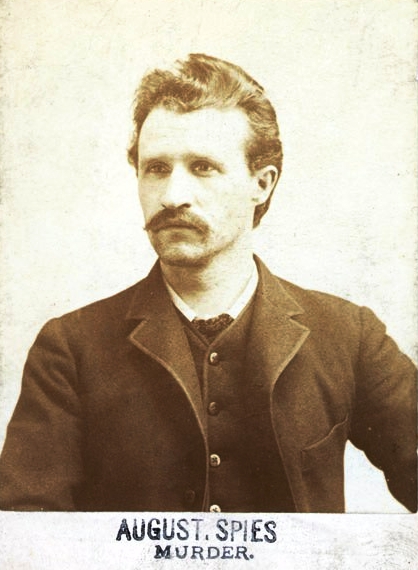International Workers’ Day and the role of a German immigrant
- 01. May 2020 - Emigration, General, German-American, Germany, Historical Events, Knowledge, Personalities
Every year on 01 May, International Workers’ Day (or Labor Day) is celebrated in many countries in different ways. However, where does this tradition come from, why was a German-American in Chicago, Illinois (by the way a sister city of Hamburg) at least partly responsible for the introduction of this day and if this is so: Why does the US of all countries celebrate Labor Day on another day?
What a German-American had to do with the introduction of 01 May as International Workers’ Day
August Vincent Theodor Spies was born in Friedewald, Hesse, Germany on 10 December 1855. He was the oldest son of a forester. After the death of his father, the financial situation of the family worsened dramatically and the 17-year-old August was forced to take action and emigrate to the US where he had some family (you can read more about reasons to emigrate from Germany here). In 1872, he arrived in New York and learned the furniture business. In the following year, he moved to Chicago, where he became self-employed in 1876 and was able to bring his mother and younger siblings to the USA, too.
Even though August Spies did well in the “new world”, he was interested in the labor movement and joined the Socialistic Labor Party of North America and soon afterwards the armed organization of working men “Lehr- und Wehrverein”. In 1880, he became the publisher and managing director of the socialist newspaper “Chicagoer Arbeiter-Zeitung” (“Chicagoan workers’ newspaper”). From 1884 to 1886 he was also its chief editor and he became one of the speakers of the labor movement in Chicago.
In the beginning of 1886, the North American labor movement called for a general strike on 01 May of that year. It was about the implementation of the eight-hour working day. In the US, 01 May was traditionally “moving day” which means many work contracts were ending or starting. Accordingly, there were often changes of workplaces (and therefore also partly of places of residence). Reputedly, the date also had something to do with successful protests on the same topic in Australia in the 1850s.
Indeed, on 01 May 1886 there were mass strikes and protests in the US. Not only in Chicago the eight-hour workingday had been a topic even before. It was at least partly due to the campaigns of the “Arbeiter-Zeitung” under August Spies that many people followed the calls and that the companies were only able to find fewer replacement workers than usual.
Following 01 May 1886, multi-day strikes took place and on 03 May, there were violent confrontations leaving dead workers.Therefore, on the following day there was a protest demonstration against the brutal police force. Among others, August Spies had called to it in his newspaper and he was one of the speakers, too. Near the end of the event, a bomb exploded and the police started to shoot at people. 7 policemen and several workers died (nobody knows how many). Many were injured. The conflict went down in US-history as “Haymarket affair” or “Haymarket riot”.
The actual culprits for the bombing were never caught, but 8 inconvenient strike organizers and speakers were accused – among them August Spies and other German-Americans. 7 of them were sentenced to death, Oscar Neebe (born in New York in 1850 as a son of German immigrants) was imprisoned. The death sentences of Samuel Fielden (born in Todmorden, England in 1847) and Michael Schwab (born in Bavaria in 1853) were commuted to life imprisonment in time. Louis Lingg (born in Baden, Germany in 1864) committed suicide before the death sentence was executed. The remaining 4, August Spies, Albert Richard Parsons (born in Montgomery, Alabama in 1848), Georg Engel (born in Kassel, Germany in 1836) and Adolph Fischer (born in Bremen, Germany) were hanged on 11 November 1887. As early as 1893, the Governor at the time, John Peter Altgeld who also had German roots, annulled the verdict. The three still living convicted persons were set free.
In 1889, on the founding congress ofthe Second International (organization of socialist and labor parties) in Paris, 01 May was proclaimed as the international Day of the labor movement in commemoration of the victims of the Haymarket affair. It was first celebrated in 1890 with mass strikes and protests all over the world.
The development in Germany
Of course, 01 May 1890 was not yet a public holiday. Partakers rather had to fear sanctions. Still, workers in Germany took part in the strikes and protests. The day became a fixed festive day of the labor movement in the following years. However, only in 1919 there was a first attempt to make it a bank holiday. This only worked for the year itself; there was no majority for making it perpetual.
Only in 1933, 01 May became a bank holiday with continued payment of wages in Germany and was called “Tag der nationalen Arbeit” (“Day of national labor”). The day was instrumentalized by the National Socialists and provided the backdrop for propagandistic parades, marches and performance shows. As early as 02 May 1933 the labor unions were brought into line, their assets confiscated and many officials imprisoned.
After the end of World War II the allies confirmed the bank holiday. Demonstrations were, however, somewhat limited for the time being. Until today, 01 May is a bank holiday in Germany. While in the Federal Republic of Germany the labor unions were calling demonstrations, 01 May in the German Democratic Republic was celebrated as a state ritual with opulent parades and called “Internationaler Kampf- und Feiertag der Werktätigen für Frieden und Sozialismus” (“international fighting and celebrating day of the working people for peace and socialism”).
Until today, the German Trade Union Confederation calls for demonstrations on 01 May, often they are accompanied by a cultural program. In 2020, for the first time since 1949 this will not be possible due to the Corona crisis. There is however an online event with a live streaming.
Labor Day in the USA
Although the origins of the International Workers‘Day were in the US, it is not really celebrated on 01 May there - but why?
The origins of the US and Canadian Labor Day also lies within the eight-hour day movement in the US. In 1882, the idea emerged to organize a celebration that every worker could attend. On 05 September 1882, a demonstration took place in New York, followed by a picnic in Elm Park. The idea was picked up in the following years by more and more cities. Since then, Labor Day is celebrated on the first Monday in September and became a federal holiday in 1894.
The reason for sticking to the first Monday in September probably has to do with the fact that it seemed to be the less controversial day. It was feared that the commemoration of the Haymarket affair might have further strengthened the socialistic and anarchistic movement.


0 comments